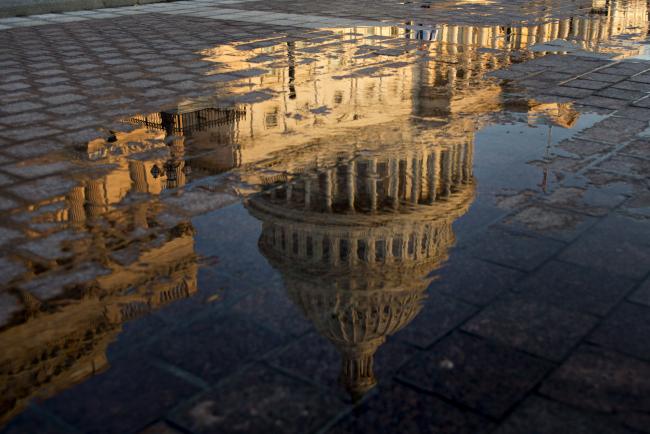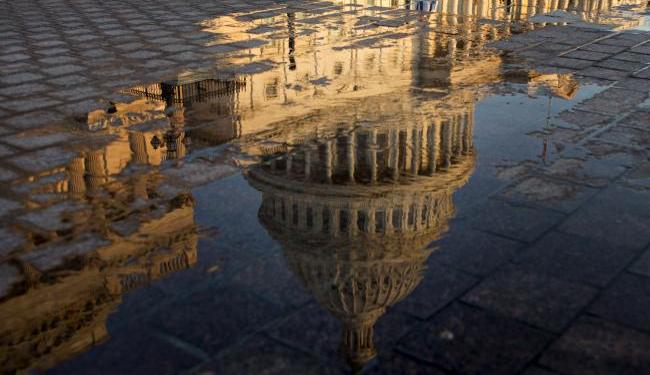 © Bloomberg. The U.S. Capitol building is reflected in a puddle at sunrise in Washington, D.C., U.S., on Wednesday, July 19, 2017. The Senate early next week will consider the motion to proceed to legislation to repeal Obamacare without finding a replacement for two years after a setback for Republicans’ efforts this week to repeal and replace the bill. Senate Majority Leader McConnell said he’s scheduling the vote at the request of President Trump and Vice President Pence. Photographer: Andrew Harrer/Bloomberg
© Bloomberg. The U.S. Capitol building is reflected in a puddle at sunrise in Washington, D.C., U.S., on Wednesday, July 19, 2017. The Senate early next week will consider the motion to proceed to legislation to repeal Obamacare without finding a replacement for two years after a setback for Republicans’ efforts this week to repeal and replace the bill. Senate Majority Leader McConnell said he’s scheduling the vote at the request of President Trump and Vice President Pence. Photographer: Andrew Harrer/Bloomberg(Bloomberg) — Tuesday’s election results handing Democrats control of the House and maintaining Republicans’ hold on the Senate, two years after Donald Trump’s victory as president, are likely to have subtle but not insignificant effects on the U.S. economy in the months ahead.
The immediate verdict from financial markets was sunny, as the stock index rallied 2.1 percent on Wednesday, while the dollar and 10-year Treasury yields were little changed. Here are five areas to watch:
Expansion Durability
Regardless of the power shift in Washington, the nine-year-old U.S. expansion seems poised to break the record for the longest ever in mid-2019. Predictions of massive swings in economic momentum after prior elections — Nobel Prize-winning economist Paul Krugman predicted a “global recession” after the 2016 election, then backtracked — proved wrong.
“Divided government isn’t a bad thing for the U.S. or the economy,” Alberto Alesina, a Harvard University economist who co-wrote a book on the economic impact of divided politics, said before the results were in. “Divided governments ensure policies that are not too extreme one way or the other get approved. It almost always ensures a very strong balance.”
Consumer Lift
The economic confidence of consumers has tended to mirror the fortunes of their candidates, with Republicans feeling more optimistic after Trump’s election while Democrats were less upbeat. Now those trends may be poised to reverse, and potentially lift overall sentiment.
“There’s an asymmetric reaction,” said Justin Waring, an investment strategist at UBS Group AG in New York, with the winning side seeing a bounce three times a large as the decline of the losing side. “There’s evidence that confidence and optimism are self-fulfilling, because they drive spending and investment decisions,” so spending could be lifted some.
There’s reason to be skeptical that Democratic gains will result in a big bounce, though. Most demographic groups surveyed, with the exception of the youngest respondents, tilt toward seeing Republicans as being best for their own finances, according to Richard Curtin, director of the University of Michigan consumer survey.
Firms’ Optimism
Business confidence, on the other hand, could be hurt. Small-business optimism in particular surged after the Trump election, according to polling by the National Federation of Independent Business.
While the Trump agenda’s business tax cuts and reduced regulation are likely to stay intact, “you could well get a weaker NFIB survey,” Lewis Alexander, chief U.S. economist at Nomura Securities International Inc. in New York, said before the election results. “Business sentiment may deteriorate in the months immediately after the election. Small businesses are more confident in the future when Republicans are in power.”
Business Investment, Fed Hikes
The expanding trade war with China is also adding uncertainty. Trump in stages slapped duties on $250 billion of goods from China and said he’d consider adding goods worth $267 billion to the list. The U.S. also has duties on steel and aluminum imports from some of its largest trading partners. All told, he threatened or imposed tariffs on virtually all products from China, which responded with duties on almost all U.S. goods entering the country.
With businesses already concerned about a trade war, divided government can bring an increase in uncertainty over economic policy that could weigh on business investment. Uncertainty may well rise, said University of Chicago economist Steven Davis, who helped to create a U.S. policy uncertainty index based on news coverage, tax laws and economic surveys.
“When Congress needs to make a decision to avoid an event or trigger, a divided Congress can inhibit the decision-making process,” he said. “Sizable increases in uncertainty are associated with modest deterioration in expected future performance. The biggest effect is on investment.”
Vincent Reinhart, chief economist at Standish, part of BNY Mellon Investment Management, said uncertainty about economic policies is a “decided impediment to private-sector decision making.”
If the president is more assertive on trade and immigration, there is a risk of “an adverse cost shock to the U.S. economy,” Reinhart, a former top official at the Fed, wrote in a note. “These forces combine to slow economic growth, likely leading the Federal Reserve to trim back its rate-hiking intentions and prompting investors to be more wary about risk.”
Fiscal Tightening?
Former President Bill Clinton found areas of cooperation with Republicans after a midterms setback for his party. If Trump and the Democrats work together, they could find areas of agreement that would lift spending, including on infrastructure, said Sassan Ghahramani, SGH Macro Advisors’ chief executive officer. He predicts “another major boost to fiscal spending.”
Absent cooperation, fiscal policy could tighten after 2019, contributing to the “Wile E. Coyote” cliff effect that former Fed Chairman Ben Bernanke has warned about. A growing budget deficit is likely to get more attention, with borrowing this year expected to more than double from 2017 to $1.34 trillion, according to the U.S. Treasury Department.
There could be “real pain” in 2020 with the end of fiscal stimulus, as well as potentially a trade war with China, said Diane Swonk, chief economist at Grant Thornton LLP in Chicago. “There could be a double whammy from fiscal policy that dampens growth and ups the risk of a full-fledged recession,” she said.
Source: Investing.com
























